The Feast of Tabernacles or Sukkot
The Feast of Tabernacles or Sukkot
Text: John 7:37-39, Leviticus 23:34-35, 39-44
Israel was commanded to observe 3 major feasts every year - Passover, Pentecost, and Tabernacles, each one revolved around the harvest season - Spring, Summer, and Fall.
The Feast of Tabernacles also called “Feast of Ingathering” (Ex.34:22) was the time they harvested all their crops.
Just like at Thanksgiving time, when all the gardens have been emptied, and the food set up for the year, we have a big meal, so God commanded the Israelites to celebrate His provision for them.
It was a time to celebrate His sustaining them, but to also remember when they lived in tents for forty years in the wilderness.
It reminded them of the “Tent of meeting,” or “Tabernacle” where God’s presence could be seen in the middle of the camp.
They may have been in a wilderness, but God’s presence and provision was ALWAYSE there.
On the first day of the 7th month started the Feast of Trumpets. Then 10 days later was The Day of Atonement. Five days later started the Feast of Tabernacles.
And all wrapped up in this last feast was a party atmosphere.
The Day of Atonement let them know they again had favor with God, then with all the work of the harvest behind them and having LOTS of food – party time!
Israel was to build booths or shelters to hang out in for 7 days.
They were usually built using poles and branches. Kids probably loved this event, as the family ate and slept in these booths, like camping in the back yard.
During the time Jesus lived, they had added more ceremonies to this feast time.
One was huge oil torches were all around the temple area that would light up the whole area, so often they would party all night.
Picture about a ¼ of a mile square, filled with people around temple.
This feast was the most joy filled celebrations, and in some of the writings of the Rabbi’s they have said, “that if you have never experienced the celebration in Jerusalem at this feast, you have never experienced joy.”
There would be special prayer for rain to come. A time of giving thanks.
Singing and dancing.
On the last day of the feast, the High Priests would have a “water pouring ceremony.”
Again picture the event - The whole area was filled with people waving palm branches and singing Psalms. Psa.118
Isa 12:2-3 “Behold, God is my salvation, I will trust and not be afraid; 'For YAH, the LORD, is my strength and song; He also has become my salvation.'" Therefore with joy you will draw water From the wells of salvation.”
The High Priest would start a procession of priests down from the Temple to the Pool of Siloam whose water came from the Gihon spring that was the main supply of water for Jerusalem.
With a golden pitcher, the priest drew water from the large pool.
Because this water came from a spring, the water was considered “living water” and was used for ritual purification.
They took the picture of “living water” back up to the temple and would do a ceremony where they poured the water out onto the altar of sacrifice.
As they were pouring the water out, and it was now running down the steps, the crowd would be praying.
Growing up in this area, we don’t have the appreciation for water that they do in the Middle East.
The only place where there is life was where there is water.
So in the Bible, water is a metaphor for life, for everything that gave life, for the Holy Spirit.
So they were praying for rain, also asking God to send the Messiah, and send His Holy Spirit.
In the middle of this noisy activity one voice cuts through the noise that silences the crowd.
John 7:37-39
Remember that these last three feasts are about end time events yet to be fulfilled.
Rev.21:3 And I heard a loud voice from heaven saying, "Behold, the tabernacle of God is with men, and He will dwell with them, and they shall be His people. God Himself will be with them and be their God.
This feast anticipates the time when God will dwell with us.
Feast of Tabernacles is all about God dwelling with man.
Isn’t that what the whole of scripture points to?
The incredible God that redeems, buys back, atones for people who don’t deserve Him, yet He wants relationship with you.
-
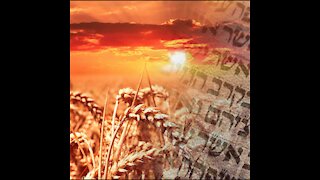 9:25
9:25
Author Lauri Matisse - Mystikcenter
3 years agoThe Feast of Shavuot (Pentecost)
109 -
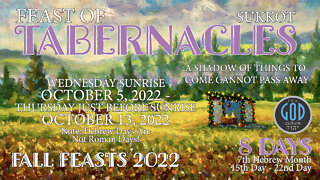 1:18:19
1:18:19
The God Culture
1 year ago $0.02 earnedThe Feast of Tabernacles: Sukkot, A Shadow Of Things To Come. Feasts of YHWH Series
461 -
 12:39
12:39
YAHUSHUASCOMING8
1 year agoFeast Of Tabernacles (Booths) in Hebrew Sukkot! Time of YAHUSHUA'S/JESUS' Birth (mirrored)
1734 -
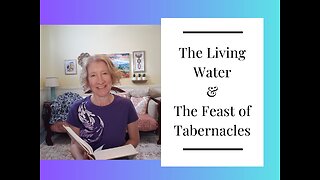 4:00
4:00
Daily God Gems
1 year agoThe Living Water and The Feast of Tabernacles
39 -
 10:06
10:06
Straitway Life
1 year agoYahweh's Feast of Tabernacles: We Shall NOT Be Found Naked - (Sukkot 2022 Tent Celebration)
57 -
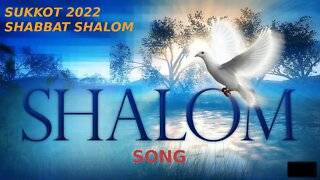 2:57
2:57
Straitway Life
1 year agoA Feast of Tabernacles Holy Day Song For 2022 Sukkot ~ Shalom Shalom To You (Music)
58 -
 6:23
6:23
tavministries
8 months agoSukkot worship at Tav Ministries
431 -
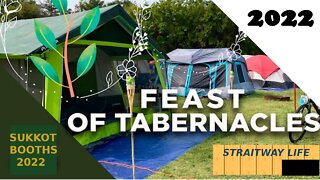 1:09:22
1:09:22
Straitway Life
1 year agoHow To Celebrate The Feast of Tabernacles / Sukkot 2022 - Leviticus 23 Torah Instructions
251 -
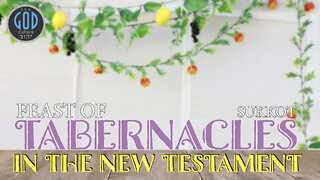 1:10:47
1:10:47
The God Culture
1 year ago $0.02 earnedThe Feast of Tabernacles in the NEW TESTAMENT. Feasts of YHWH Series
5123 -
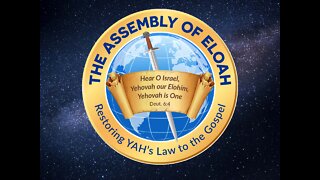 1:10:02
1:10:02
The Assembly of Eloah
1 year agoThe Feast of Tabernacles (Day 1 FoT 2022)
6